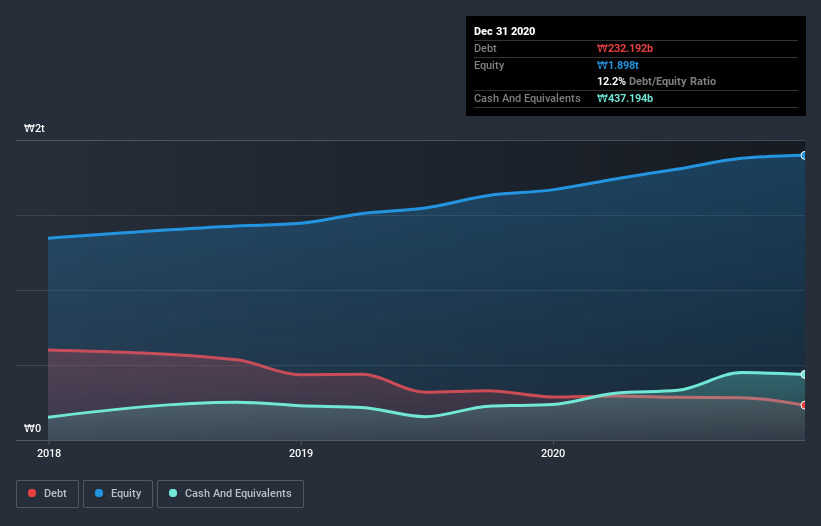Warren Buffett famously said, 'Volatility is far from synonymous with risk.' So it seems the smart money knows that debt - which is usually involved in bankruptcies - is a very important factor, when you assess how risky a company is. Importantly, ORION Corp. (KRX:271560) does carry debt. But the real question is whether this debt is making the company risky.
Why Does Debt Bring Risk?
Debt assists a business until the business has trouble paying it off, either with new capital or with free cash flow. If things get really bad, the lenders can take control of the business. However, a more usual (but still expensive) situation is where a company must dilute shareholders at a cheap share price simply to get debt under control. By replacing dilution, though, debt can be an extremely good tool for businesses that need capital to invest in growth at high rates of return. The first thing to do when considering how much debt a business uses is to look at its cash and debt together.
View our latest analysis for ORION
How Much Debt Does ORION Carry?
As you can see below, ORION had ₩232.2b of debt at December 2020, down from ₩286.8b a year prior. But on the other hand it also has ₩437.2b in cash, leading to a ₩205.0b net cash position.

A Look At ORION's Liabilities
Zooming in on the latest balance sheet data, we can see that ORION had liabilities of ₩345.5b due within 12 months and liabilities of ₩422.4b due beyond that. On the other hand, it had cash of ₩437.2b and ₩165.5b worth of receivables due within a year. So it has liabilities totalling ₩165.2b more than its cash and near-term receivables, combined.
Of course, ORION has a market capitalization of ₩5.20t, so these liabilities are probably manageable. But there are sufficient liabilities that we would certainly recommend shareholders continue to monitor the balance sheet, going forward. Despite its noteworthy liabilities, ORION boasts net cash, so it's fair to say it does not have a heavy debt load!
And we also note warmly that ORION grew its EBIT by 15% last year, making its debt load easier to handle. The balance sheet is clearly the area to focus on when you are analysing debt. But it is future earnings, more than anything, that will determine ORION's ability to maintain a healthy balance sheet going forward. So if you're focused on the future you can check out this free report showing analyst profit forecasts.
Finally, a company can only pay off debt with cold hard cash, not accounting profits. ORION may have net cash on the balance sheet, but it is still interesting to look at how well the business converts its earnings before interest and tax (EBIT) to free cash flow, because that will influence both its need for, and its capacity to manage debt. Over the last three years, ORION recorded free cash flow worth a fulsome 80% of its EBIT, which is stronger than we'd usually expect. That positions it well to pay down debt if desirable to do so.
Summing up
We could understand if investors are concerned about ORION's liabilities, but we can be reassured by the fact it has has net cash of ₩205.0b. And it impressed us with free cash flow of ₩304b, being 80% of its EBIT. So we don't think ORION's use of debt is risky. Over time, share prices tend to follow earnings per share, so if you're interested in ORION, you may well want to click here to check an interactive graph of its earnings per share history.
When all is said and done, sometimes its easier to focus on companies that don't even need debt. Readers can access a list of growth stocks with zero net debt 100% free, right now.
If you decide to trade ORION, use the lowest-cost* platform that is rated #1 Overall by Barron’s, Interactive Brokers. Trade stocks, options, futures, forex, bonds and funds on 135 markets, all from a single integrated account. Promoted
New: AI Stock Screener & Alerts
Our new AI Stock Screener scans the market every day to uncover opportunities.
• Dividend Powerhouses (3%+ Yield)
• Undervalued Small Caps with Insider Buying
• High growth Tech and AI Companies
Or build your own from over 50 metrics.
This article by Simply Wall St is general in nature. It does not constitute a recommendation to buy or sell any stock, and does not take account of your objectives, or your financial situation. We aim to bring you long-term focused analysis driven by fundamental data. Note that our analysis may not factor in the latest price-sensitive company announcements or qualitative material. Simply Wall St has no position in any stocks mentioned.
*Interactive Brokers Rated Lowest Cost Broker by StockBrokers.com Annual Online Review 2020
Have feedback on this article? Concerned about the content? Get in touch with us directly. Alternatively, email editorial-team (at) simplywallst.com.
About KOSE:A271560
ORION
Engages in the manufacture and sale of various confectionery products in South Korea, China, and internationally.
Very undervalued with flawless balance sheet.
Market Insights
Community Narratives





